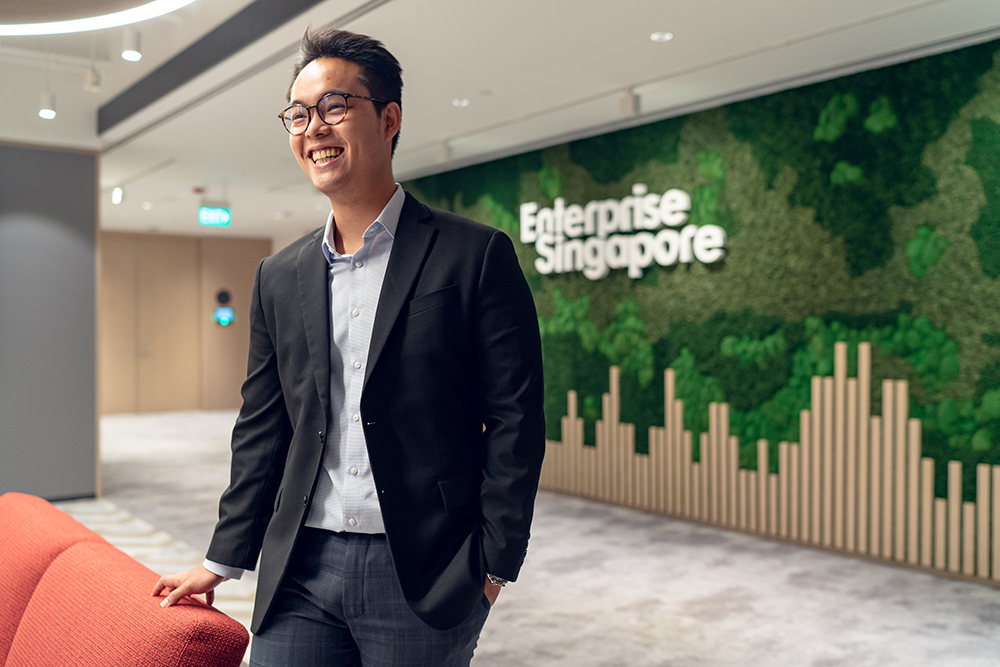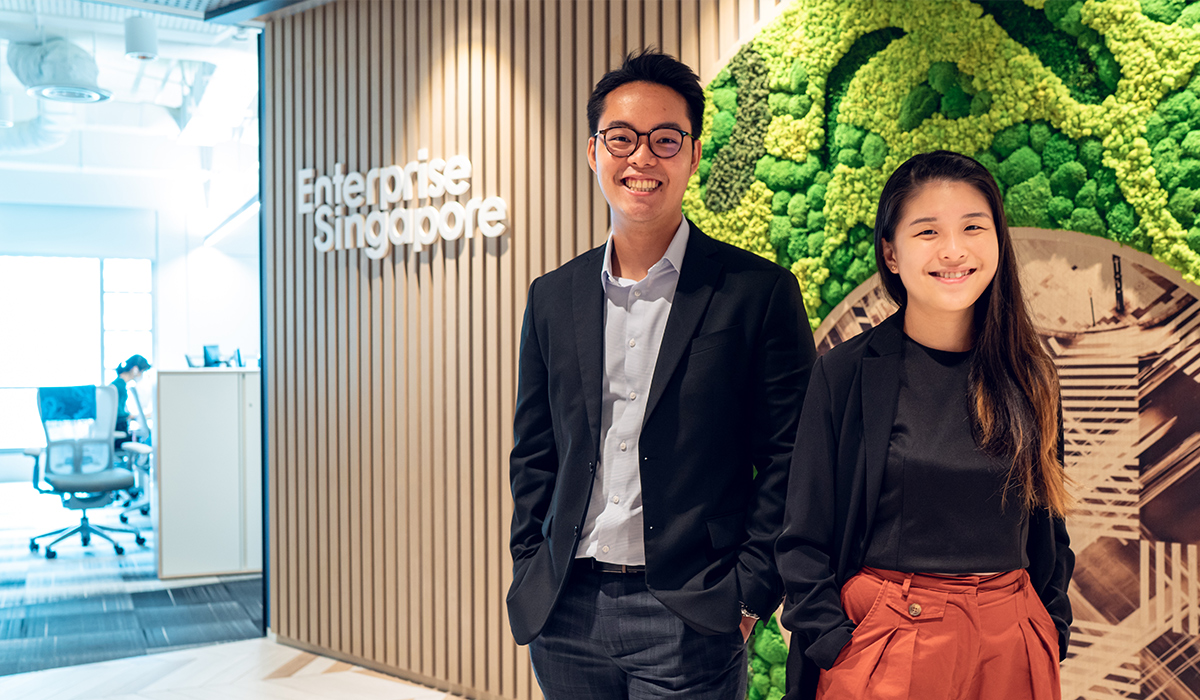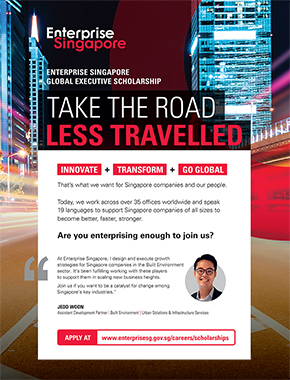Left: Jedd Woon drives growth in his sector as Assistant Development Partner in Built Environment. He is an Enterprise Singapore Global Executive Scholar, and holds a Bachelor of Engineering in Mechanical Engineering with a minor in Management of Technology from the National University of Singapore.
Right: Cheryl Yau catalyses a vibrant Agritech ecosystem in her role as Assistant Development Partner in Agritech. She is an Enterprise Singapore Global Executive Scholar, and holds a Bachelor of Arts in International Relations and Economics with a minor in Asian Studies from Pomona College, California.
Their sectors may differ vastly in market maturity, but Jedd Woon, Assistant Development Partner in Built Environment, and Cheryl Yau, Assistant Development Partner in Agritech, have the same aim – to develop resilient and competitive industries.
These young scholars from Enterprise Singapore (ESG) share with us the efforts that go into growing stronger local enterprises, as well as their career motivations and aspirations.
How did you get interested in pursuing a career in public service and in particular, at Enterprise Singapore?
Cheryl: Public service has always been a career option that I considered. I've benefited from our public education programmes growing up, so I wanted to do something in return. I believe that building a resilient economy requires a strong base of locally-owned companies with a global footprint, which naturally led me to ESG. My internship at ESG after my A levels played a big factor in my decision to join them. I appreciated that ESG offered a good balance between operations and strategy, and saw how both of these areas complemented one other during my internship stint.
Jedd: In my first year of university as an engineering student, my interest in entrepreneurship was piqued when I interned for a local startup during my summer holidays. However, I realised I was more interested in the process that goes behind building a company, rather than starting an actual business of my own. This was why ESG appealed to me. In fact, it was the only scholarship that I applied for, as I was drawn to its mandate of helping startups and SMEs grow and become competitive.

Jedd Woon
Your sectors are quite different from each other. Tell us more about your current roles and responsibilities.
Jedd: I am with the Built Environment division and I work with companies in the building and construction industry. Most of our focus lies in helping them to expand overseas or develop new products to grow their revenue, as well as encouraging them to digitalise manual operations to achieve time and cost savings.
Notably, I had the opportunity to broker a deal with a foreign venture capital firm to help local construction tech startups gain access to investment and customers.
It was a long-drawn process, but one that was impactful to the industry, as tech adoption in the construction space is generally slower. I'm very proud to have undertaken this task in just my first year at ESG.
Cheryl: Industry cluster officers perform a mix of company account management and industry development work. The Agritech sector is a nascent sector so my work leans towards the latter. We are looking to champion Singapore as a hub for high-tech farming technologies, which requires us to work closely with other agencies on areas such as regulatory review, infrastructure master-planning, and more. Personally, I work on projects centred around demand-building (all the vegetables would be no good if nobody wants them!), and technology and expertise matching and sourcing.
Cheryl, you have a background in International Relations and Economics, while Jedd is a trained engineer. How have you applied your academic background to your role?
Cheryl: My academic background has given me a good foundation to understand and process the things that are happening around me. For instance, my background in macroeconomics and public sector economics has shaped the way I think about the government's role in the economy, and the principles behind some of the industry projects we initiate. I examined the organisation of trade and business under global production networks for my thesis, which was useful to help me understand the capabilities and limitations of certain countries in coping with the Covid-19 pandemic.

Cheryl Yau
Jedd: The macro training I've received – such as system design, problem solving, iteration and analytical thinking – as an engineering student is most applicable to my work at ESG. Solving business problems is similar to solving engineering problems. When we design a business growth programme for companies, we have to consider how the various factors interact with each other, identify gaps, and how the programme can address them. If these objectives are not met, we'll fine-tune the programme for the second or third time until we get it right.
We read about the Management Associate Programme (MAP) that all fresh graduates go through upon joining ESG. The MAP gives fresh graduates a chance to develop holistically through three rotations across core business functions of ESG, and through the exposure, find out which sector they are more suited to. How has the MAP helped you?
Jedd: For one, I learnt about my current division via the MAP. Built Environment was my first rotation and I requested to return to it as I found the work there meaningful. Apart from understanding the different facets of ESG, the MAP also gave me the chance to be part of a supportive community and share experiences with the other management associates in my batch. And as we know, having a network facilitates work and conversations.
Cheryl: Coincidentally, the Agritech division was also my first rotation, and I haven't looked back since. The MAP provides an invaluable opportunity to learn about both what we like, and what we don't like. Having a network of peers dispersed across different teams in ESG has also been extremely helpful to my day-to-day work.
Finally, why should aspiring scholars join ESG?
Cheryl: I would turn the question back to aspiring scholars to ask if they can identify with the mandate of ESG, and about their interests and skillsets. Do also consider the stakeholders you want to engage and are good at engaging. Going through this thought process led me to joining ESG.
Jedd: The opportunities that you get at ESG and the exposure to C-suite executives and market intermediaries is something that may be difficult to obtain for a fresh graduate or a new hire elsewhere. Building up your networks at the onset of your career is important for the longevity of your career.


